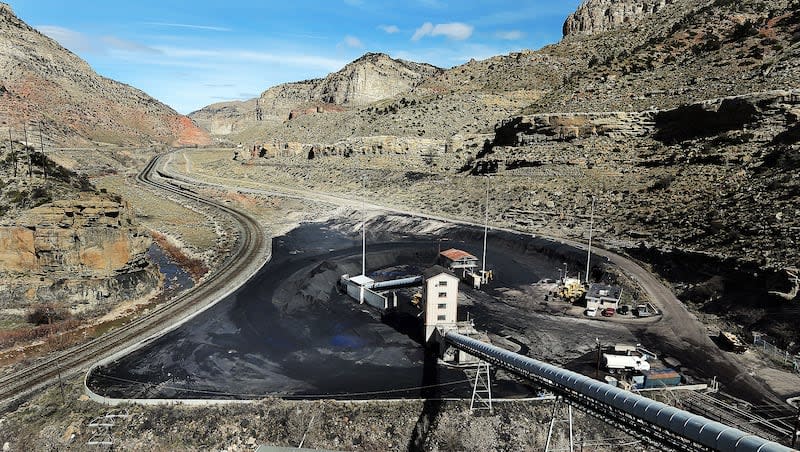Critics worry legislative measure will delay closing Utah’s coal fired-power plants

- Oops!Something went wrong.Please try again later.
A Utah legislative committee met Tuesday to discuss a measure that more closely safeguards a pair of power plants with more Utah oversight over their inevitable closure.
The bill, HB224, by Sen. Scott Sandall, R-Tremonton, was heard in the House Public Utilities, Energy and Technology Committee and addresses concerns over the viability of Utah’s two power plants in Emery County as surrounding states increasingly cut their use of coal.
That led Michelle Beck, director of the Utah Office of Consumer Services, to assert this new regulatory approach by Utah lawmakers upends a well-established system, charts territory not tried by other states and will shift costs to Utah ratepayers with little to no input from them.
Logan Mitchell, climate scientist and energy analyst with Utah Clean Energy, said Utah has to be flexible in a rapidly changing energy market that recognizes technological advances, instead of hanging onto the old.
“There are ongoing costs for procuring fuel and maintenance in some of the facilities that are in the state that are 50 years old. They were state of the art when we had rotary dial telephones. And you know, they’re still working great today, but there are ongoing maintenance costs associated with keeping them running. And the costs of new resources have undergone dramatic declines over the last decade,” he said.
He emphasized that PacifCorp’s own plans for resource procurement include nine gigawatts of battery storage to be developed over the next several years in contrast to what currently exists across the entire country — 1.5 gigawatts of battery storage.
“This takes Utah away from an all of the above approach, and may foreclose the timely opportunities for Rocky Mountain Power to bring new, clean resources online,” Mitchell added.
Dalley Cutler, a climate change activist and Salt Lake City resident, said it makes little sense for the state l to entrench itself further in coal.
“For me, it’s illogical for this committee to prop up obsolete coal infrastructure, especially given the major public health issues that are caused by burning coal,” he said.
“I’ve done my best to grasp its implications and what I’ve learned about the changes to the utility regulation is really concerning to me.”
Sandall pushed back on critics.
“Utah is an all of the above (energy) state interested in innovation and applying new technical technologies where they make sense. What does not make sense is abandoning proven dispatchable energy resources that we need to power our economy and gamble that our economy will do well with intermittent sources, like wind coupled with batteries,” Sandall said. “We can’t just rely on wind and solar to hold us over until promising dispatchable technologies like nuclear or geothermal reach operational and economic maturity. We also can’t allow other states to continue to push their policies onto Utah while they undermine reliability and cost stability,” he said.
“This makes the Public Service Commission accountable to the Legislature for considering the importance of dispatchable resources in its decision making and finally allows them to consider opportunities to sell excess energy from dispatchable resources into interstate markets to meet the expected demands of states intentionally going short,” he said.
As other states in the PacifCorp fleet turn away from coal and toward more renewables, critics believe Utah ratepayers will be shouldering the burden of higher costs due to the declining coal market.
Sandall disagreed, saying those states will need the energy provided by Utah’s power plants.
“I don’t believe that this is going to increase the costs. I believe that in the long run, we are going to be able to sell this power that’s dispatchable into markets and states around us who make alternative decisions to ours. And trust me when they want to turn the lights on, they will pop into the grid and they will buy our power. It will be more expensive for them to pay for it and our rate payers will benefit from that by selling that power at a higher price. I don’t have any doubt that that’s going to happen,” he said. “Utah is taking the position that we’re going to make sure the lights are turned on. And I believe that we are doing it in a reasonable way.”
The bill passed the committee on a 6-3 vote and now goes to the full House for consideration.

